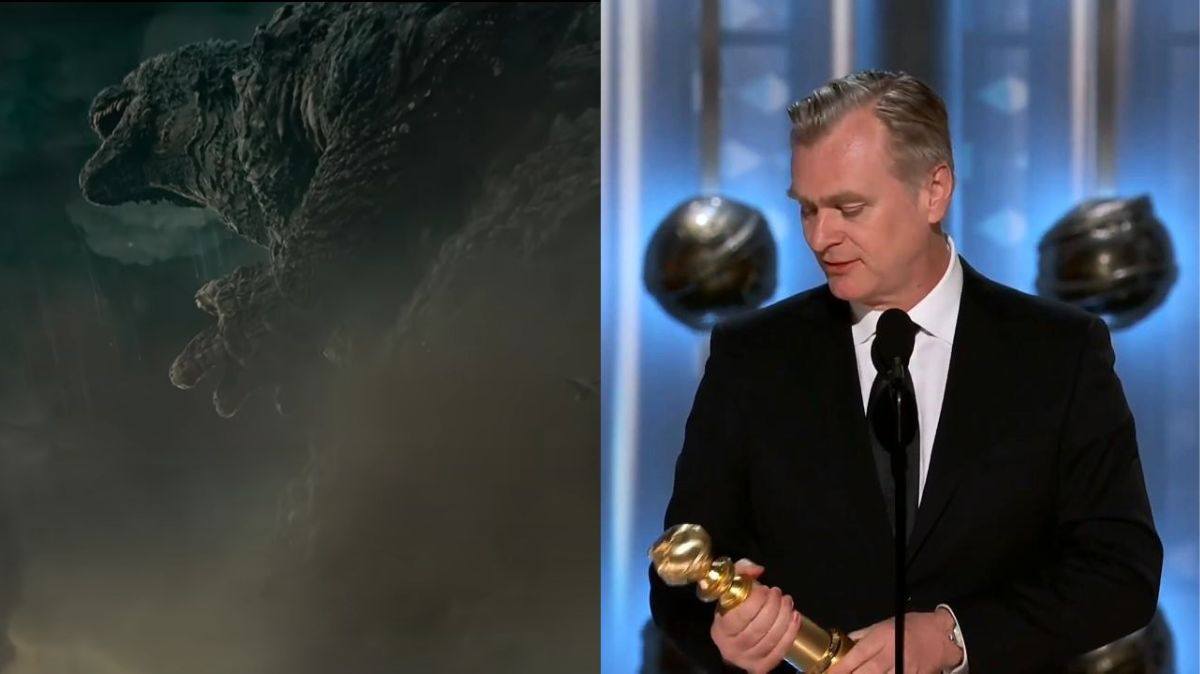In a cinematic landscape brimming with accolades and artistic triumphs, Christopher Nolan, the virtuoso behind “Oppenheimer,” finds himself immersed in a fervor of admiration for Takashi Yamazaki’s masterpiece, “Godzilla Minus One.” Basking in the glow of his own triumph with “Oppenheimer” securing the coveted Best Picture honor at the illustrious 2024 Academy Awards, Nolan engaged in a captivating dialogue with Yamazaki, the maestro responsible for the epic “Godzilla Minus One,” ahead of its much-anticipated release in Japan.
With an effusion of praise, Nolan effervescently articulated his admiration for Yamazaki’s opus. In a mesmerizing exchange captured on video, Nolan lauded the film’s magnificence, heralding it as a tour de force in cinematic craftsmanship. “I watched ‘Godzilla Minus One’ and I thought it was a tremendous film,” Nolan remarked, his words echoing with genuine reverence. “I thought it was so exciting. I mean, obviously it’s beautifully made, and the mechanics of it are so involving.”
Yet, Nolan’s admiration transcended mere technical prowess. Delving into the film’s thematic depths, he lauded its profound resonance, drawing parallels to Yamazaki’s earlier work, “The Eternal Zero.” “It’s so exciting, but also I felt like it had a lot of the spirit of your earlier film, ‘The Eternal Zero.’ It had a depth around the issues surrounding the main story, even though the main story is ‘Godzilla,’ and is an entertaining and exciting one,” Nolan mused, his words laden with discerning insight. “There was also wonderful depths of the characters, and a wonderful sense of history that I really appreciated.”
Intriguingly, while “Oppenheimer” delves into the harrowing narrative of the atomic bomb’s creation, “Godzilla Minus One” navigates the tumultuous aftermath of its cataclysmic deployment on Japanese soil during World War II. This thematic symmetry prompted Yamazaki to contemplate a cinematic rejoinder, a narrative that would illuminate the Japanese perspective on this epochal moment in history.
In response to Yamazaki’s proposition, Nolan expressed unwavering support, extolling the virtuosity of the Japanese auteur. “I can’t think of a better director to make a response than director Yamazaki, so I think it’s a perfect suggestion,” Nolan declared, his conviction resounding with an air of reverence. “I’m always interested to see what you will be doing in the future.”
“Godzilla Minus One” ascended to cinematic eminence, etching its name in the annals of history as the inaugural film in the storied “Godzilla” franchise to secure a nomination for Best Visual Effects. A triumphant moment ensued as Yamazaki clinched the coveted Best Visual Effects Oscar at the prestigious March 2024 ceremony, marking a watershed moment for Japanese cinema. With a modest production budget of $15 million, Yamazaki, the visionary auteur, assumed the mantle of not only writer and director but also the meticulous stewardship of visual effects.
Reflecting on the film’s genesis, Yamazaki offered poignant insights into its thematic underpinnings. “I’m a huge fan of the very first 1954 ‘Godzilla.’ And to me, that film was a response to nuclear warheads and where the world was heading at that point in time,” Yamazaki shared, his voice suffused with a blend of reverence and introspection. “So Godzilla being this metaphor for nuclear warheads, I think, was very important to return to and not forget.”
Amidst the tumult of production, Yamazaki found himself ensconced in a disconcerting juxtaposition, as the unfolding events in the world mirrored the very themes he sought to encapsulate in celluloid. “During the production, it was both surprising and disturbing to see the state of the world unfold and reading the headlines because we were making a film about Godzilla and the subject matter it represents,” Yamazaki reflected, his words resonating with a poignant timeliness. “And in some weird way, I feel, the timing of different Godzilla films, especially with the context of Japan, it almost feels like this divine ritual or offering to the gods of some sort.”
In a cinematic odyssey marked by reverence, admiration, and thematic resonance, “Godzilla Minus One” emerges as a magnum opus, a testament to the indomitable spirit of storytelling and the transcendent power of cinema. As the echoes of acclaim reverberate through the hallowed halls of cinema, Takashi Yamazaki stands as a beacon of cinematic brilliance, his vision immortalized in the annals of cinematic history.
Trailer:













Great post, I believe people should acquire a lot from this weblog its very user friendly.
of course like your website but you need to check the spelling on several of your posts. Several of them are rife with spelling issues and I find it very troublesome to tell the truth nevertheless I¦ll definitely come back again.
F*ckin’ amazing things here. I’m very happy to see your article. Thank you a lot and i’m having a look ahead to contact you. Will you kindly drop me a e-mail?
I’ve recently started a web site, the info you provide on this site has helped me tremendously. Thank you for all of your time & work.